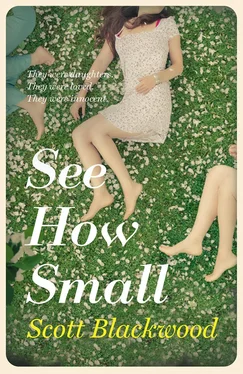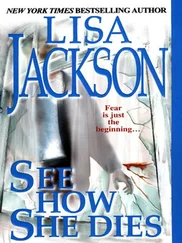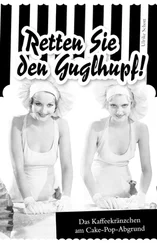Take off your clothes, the men with guns said.
Please, we said.
Now, they said.
Please let us go, we said. We won’t tell anyone.
Not anyone? They smiled with their guns.
Not anyone, we said. Please.
Our jeans and boots and jackets and shirts were piled high in the middle of the floor, like a breaking wave.
The tile was cold under our feet.
Across the room, the stainless-steel ice cream case gleamed. On the floor beside it, the cash register drawer sprawled on its side.
What a shame, our mothers said from somewhere, no time to tidy up.
Before the men with guns bound and gagged us with our own bras and panties right after closing time, a few things happened: one of us hid inside her mouth the opal class ring her boyfriend had given her and remembered her mother singing “Sweet Baby James” and stroking her forehead when she had her migraines. The youngest of us, who always threw up before gym class because she was afraid of being naked, realized that this time she wouldn’t. Another remembered the pride she’d felt the day before, riding a horse no one in her family could ride, a horse that had thrown her older sister. He knows your true heart, her father had said. The horse’s shoulders were lathered with sweat. He had a salty, earthy smell she’d thought of as love.
The men with guns did things to us.
Afterward, our cheeks against the tile, we could smell something in the air like our own blood. Then lighter fluid. Burning plastic. Flames climbed the walls, flashed over the ceiling. Eventually the pipes above us burst.
Our mothers wore disappointed faces.
We waited for a voice.
We waited for a light.
Near the dumped-over register drawer, a bed-wetting nine-year-old boy we’d all babysat one time or another appeared. Nicholas. He smelled like sandalwood soap and pee. He would lie to us about brushing his teeth. He would walk in on us in the bathroom, where there wasn’t a lock. What are you doing here? we demanded. His stealthy blue eyes gazed back. You must be cold, he said to us on the floor. Where are your clothes? He pretended not to know they were burning. Nicholas. Some things never change.
It grew hot, dark, and wet like first things.
But then you came into the fire. Found us. In all that dark and smoke and water: a bright, bare foot. The hopeful turn of an ankle. You clothed us in light. Washed our hair.
Instead of nothing, we have you.
2 Contents Cover Title Page Copyright Dedication Epigraphs Part I Chapter 1 Chapter 2 Chapter 3 Chapter 4 Chapter 5 Chapter 6 Chapter 7 Chapter 8 Chapter 9 Chapter 10 Chapter 11 Chapter 12 Chapter 13 Chapter 14 Chapter 15 Chapter 16 Part II Chapter 17 Chapter 18 Chapter 19 Chapter 20 Chapter 21 Chapter 22 Chapter 23 Chapter 24 Chapter 25 Chapter 26 Chapter 27 Chapter 28 Part III Chapter 29 Chapter 30 Chapter 31 Chapter 32 Chapter 33 Chapter 34 Part IV Chapter 35 Chapter 36 Chapter 37 Chapter 38 Chapter 39 Chapter 40 Chapter 41 Chapter 42 Part V Chapter 43 Chapter 44 Chapter 45 Chapter 46 Chapter 47 Chapter 48 Chapter 49 Chapter 50 Chapter 51 Chapter 52 Chapter 53 Chapter 54 Chapter 55 Chapter 56 Chapter 57 Chapter 58 Chapter 59 Chapter 60 Acknowledgments About the Author By the Same Author About the Publisher
KATE’S TWO DAUGHTERS are working behind the counter of the ice cream shop Kate and her ex-husband once owned. The girls wear robin’s-egg-blue polo shirts with sandra’s — Kate’s mother’s name — stitched in gold across their chests, their name tags just above. The girls are bird-breasted, Kate thinks, but not wispy, not fragile. Their hair — Elizabeth’s dark, Zadie’s coffee and milk — pulled back in ponytails, which makes the freckled slope of their foreheads and noses more pronounced, like Kate’s. The girls are talking to customers — wide-eyed, polite attentiveness for the adults; rolled-eyed smirking for the languid, horse-faced boys from their high school, shambling in line. Elizabeth, Kate’s younger daughter, at the front register, her face roiled with the first joys of being noticed and confusion over change amounts. Zadie, distant-eyed and aloof, at the drive-through window, leaning out into the shadowy late afternoon. Half swallowed up, Kate thinks, like an offering.
The ice cream shop smells of waffle cones. After their late shifts, the girls bring home this smell pleated in their clothes and hair — how they hate it, this baked-in dark sweetness. Conefication , they call it. Before bed, the girls will try scrubbing it from their skin. But to Kate — lying fitfully in the dark alongside her sleeping then-husband Ray — it’s the smell of gratefulness. All day, she’s fasted on the girls’ absence. And now the thick, sugary smell of them is everywhere. Slowly, slowly, she cautions herself. The starved can only take in so much at once.
Some of Kate’s friends think the girls are standoffish, too much in their own heads, troubled. Those Ulrich girls, they say. Kate knows this. There are whispers about her permissiveness, about drive-through window bartering of wine coolers and rum for sundaes and shakes. Grass-fire rumors about older boys and mushrooms in Zilker Park (conjured up, she suspects, by Sarah Haven, whose son was hauled off to alternative school and whose husband sleeps with men). The girls have tested Kate, it’s true. There was the time Zadie was caught shoplifting cosmetics. Pink coral lipstick. Or was it condoms? Kate decides it was both for continuity’s sake.
Now out in the ice cream shop parking lot, the last of the sun flares off car hoods. A chill is settling in. Some of the dropouts and hangers-on clown and take photos in front of Hollis Finger’s beat-up art car, its roof and hood tattooed with a mosaic of seashells, buttons, beads, metal army men, and hairless dolls. Hollis Finger, who because of a wartime head injury can’t find the mental thread on which to string the everyday beads of his life, looks out with indigestion at the scene from one of the shop’s cramped tables.
Meredith — Mare, the girls call her, because of her horse riding and sometimes, it’s true, because of her incisors, which jut at odd angles — walks in through the front door fifteen minutes late. Zadie looks over from the drive-through. Elizabeth smirks. Meredith — her mind in full gallop — has forgotten her sandra’s shirt. She makes wide eyes at the girls, meaning, of course, that she has a secret. Maneuvers through the line, then around the end of the counter, ties an apron around her waist. Zadie says, I hope it was worth it, and slams the drive-through register drawer closed as if Meredith’s finger is inside.
Then, for some reason, most likely because Kate Ulrich is embellishing, revising even as she reimagines it, the parking lot goes dark. Days are shorter now, Kate thinks. Winter closing in. The girls’ summery arms and sunshine feet growing paler. Soon everyone in line will rush off to day-care pickup, soccer practice, dinner, or dates. Kate knows many of them, knows they weren’t really gathered here on this day, at this early-evening hour, but it seems right somehow. Meredith’s father, who owns a horse ranch west of town and a real estate agency that Kate will later work for, waves at Meredith from the front. He holds up the sandra’s shirt she left behind on the kitchen table at home. Beside him, Rosa Heller, a newspaper reporter, hunches her shoulders to hide her six-foot height. Nearby, twirling her hair with her fingers, Margo Farbrother, who has discovered — against all odds — a child hidden in the folds of her fibroid-filled uterus. Jack Dewey, a firefighter who lives in Kate’s neighborhood, whose daughter, Sam, has gone missing. Jack will soon be tethered to Kate by an invisible cord and anchored to this very spot.
There is a young man in line Kate doesn’t know. Smooth-shaven, his face pale and round, hands jammed in the pockets of an elegant gray wool overcoat. Something vintage. Later, he’ll be described as secretive and nervous, but this won’t be right. The young man insists that others go ahead of him, says that he’s undecided. The wool overcoat is too big in the shoulders, oversize in the cuffs, so the young man seems smaller than he is. Maybe even younger than he is. In fact, he doesn’t seem to have an age. His skin is creaseless but you can see the adult in his eyes. Who’s in there? Kate wonders. I’m undecided , he says again, and gestures toward the counter as if he were an usher showing them to seats at a performance. There is something gallant about the coat and gesture, Kate thinks. Something ageless and chivalrous that pleases her, but also leaves her cold. Maybe his eyes.
Читать дальше












